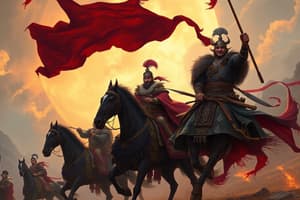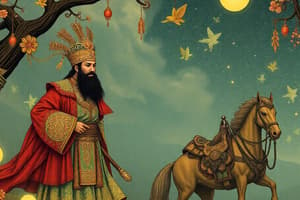Podcast
Questions and Answers
What was one of the reasons for the Mongols' ability to build a vast empire quickly?
What was one of the reasons for the Mongols' ability to build a vast empire quickly?
- Separated government and religion
- Skilled horseback riders (correct)
- Practiced Buddhism
- Adopted Arab, Persian, and Turkish ways
What influenced the expansion of the Mongol empire after Genghis Khan's death?
What influenced the expansion of the Mongol empire after Genghis Khan's death?
- Used civil service exam
- The empire was split into 4 different sections
- Adopted Arab, Persian, and Turkish ways
- The empire expanded after Genghis Khan died (correct)
How did the Mongols rule the Chinese during the Yuan Dynasty?
How did the Mongols rule the Chinese during the Yuan Dynasty?
- Used civil service exam
- Government jobs were open to anyone of any race (correct)
- Respected other religions
- Mongols won support of Chinese people
Why were the Mongols unable to conquer Japan?
Why were the Mongols unable to conquer Japan?
What was one of the skills the Mongols developed for nomadic living?
What was one of the skills the Mongols developed for nomadic living?
Who was the future Genghis Khan born as?
Who was the future Genghis Khan born as?
Which of the following geographical regions did the Mongol rule extend to?
Which of the following geographical regions did the Mongol rule extend to?
What did the Mongols adopt and learn from the cultures they conquered?
What did the Mongols adopt and learn from the cultures they conquered?
Who continued the conquest of China after Genghis Khan?
Who continued the conquest of China after Genghis Khan?
What religion(s) did the Mongols tolerate and sometimes adopt?
What religion(s) did the Mongols tolerate and sometimes adopt?
What was one of the consequences of the Mongols' lack of use of the civil service exam in China?
What was one of the consequences of the Mongols' lack of use of the civil service exam in China?
What was the significance of Marco Polo's book?
What was the significance of Marco Polo's book?
What was one effect of the Mongols' admiration for the cultures they conquered?
What was one effect of the Mongols' admiration for the cultures they conquered?
How did the Mongols attempt to overcome their inability to conquer Japan?
How did the Mongols attempt to overcome their inability to conquer Japan?
What strategy did the Mongols use to try to invade Japan?
What strategy did the Mongols use to try to invade Japan?
What was the outcome of the Mongol conquest of China in terms of government and religion?
What was the outcome of the Mongol conquest of China in terms of government and religion?
How did Genghis Khan's death impact the Mongol empire's expansion?
How did Genghis Khan's death impact the Mongol empire's expansion?
What was one of the factors contributing to the Mongols' ability to build a vast empire quickly?
What was one of the factors contributing to the Mongols' ability to build a vast empire quickly?
Flashcards are hidden until you start studying
Study Notes
- The Mongols, a nomadic group from central Asia, became the first non-Chinese people to rule all of China.
- Mongol history: They developed skills for nomadic living, including excellent horseback riding and fighting skills.
- Early Mongol leaders: Temujin, the future Genghis Khan, was born under difficult circumstances and eventually gained power through military conquests and alliances.
- Mongols conquered new lands, creating a vast empire, with Genghis Khan as its founder and leader.
- Mongols adopted and learned from the cultures they conquered, including gunpowder and Chinese administrative practices.
- Mongol rule extended from the Pacific Ocean to eastern Europe, bringing stability and encouraging trade.
- Mongols tolerated all religions and sometimes adopted them, such as Islam and Buddhism.
- Mongol government did not use civil service examinations, appointing non-Chinese people to top jobs.
- Mongol emperor Kublai Khan, a grandson of Genghis Khan, continued the conquest of China and established his capital in northern China.
- Mongols reached the height of their wealth and power under Mongol rule, despite being foreigners.
- Famous European traveler Marco Polo lived in China under Kublai Khan, writing about the magnificent city and its prosperity.
- Mongol armies attempted to invade Japan but were unsuccessful due to storms.
- Mongols ruled Korea and forced Koreans to build warships for Mongol invasion attempts on Japan.
- Kublai Khan, Genghis Khan's grandson, achieved great power and ruled over land stretching from the Pacific Ocean to the Black Sea.
- Mongols promoted economic growth and peace in China, leading to prosperity and trade.
Studying That Suits You
Use AI to generate personalized quizzes and flashcards to suit your learning preferences.




